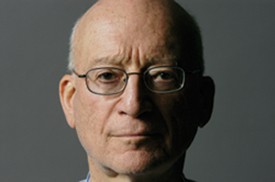Are moral values slipping in America?
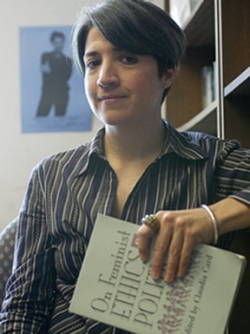
Chris Cuomo, philosophy professor. Photo/Lisa Ventre
Picking up a newspaper can be a scary way to start the morning: terrorist bombings, guns in classrooms, Terri Schiavo, Enron, politicians lying to constituents and journalists misleading us all. Our gut reaction is to fling open a window and scream, “I'm not going to take it anymore.”
We want it to end. We want people to blame.
“Society's decline of moral values” seems to sum it all up, but the tag offers no hints for resolution. We're desperate for stronger families and for civility in treating each other the way we want to be treated.
Yet amid our fevered search for answers, we notice a curious thing -- that nearly everyone is struggling over the same concerns. Doesn't that imply that we once had common values to begin with? And probably still do?
Then why does everything that we, as a society, hold dear appear to be vaporizing with each rising sun?
“Human beings are complicated critters,” philosophy professor Larry Jost says. “Lots of people with good moral values fail. To be human is to be vulnerable to all kinds of weakness -- from drinking or diets to having affairs. Some people are stronger and can face temptation, but it's a hard thing to be moral, day in and day out.”
Being selfish is far easier. History proves the point: the near annihilation of American Indians, the Salem witch trials, slavery, Japanese internment camps and McCarthy Era blacklists -- all marring the reputation of a country that calls itself the “land of the free” and all within a short span of a few hundred years. Based upon that historical view, Jost says, “I'd argue society is getting better.” The tone of his voice, however, indicates the answer is far from simple. “Every culture and era have had important questions,” he says. “The questions we face are different in their complexity, but not more difficult.”
Complexity of life
“I think the perception of a moral decline comes from an increased awareness of the complexity of society,” says Chris Cuomo, professor of philosophy. “A diverse, democratic society will always have good and bad things going on at the same time, but our lives are so confusing now that we don't know what to do about it.”
The complexity of life does make drawing a line between good and evil difficult. When does life begin and end? What about stem-cell research, cloning, performance-enhancing drugs, Internet strategies?
“One reason ethics is so hard,” Jost says, “is that the situations we face are constantly changing. We now have life-and-death decisions we never faced before. Knowing someone might have a genetic marker for a terrible disease, for instance -- what happens if insurance companies get that information?”
Education without values,
as useful as it is, seems rather
to make man a more clever devil.
-- C.S. Lewis, 1898-1963
“Even though threats to civil liberties and threats from terrorism are hardly unique to our day and age, so many options today have such an important impact on what's at the heart of ethics,” says assistant professor of philosophy Julian Wuerth. “Biotechnology, for example, opens a staggering range of ethical dilemmas.”
Although the medical, biological and genetic implications are overwhelming, technology has raised other moral concerns, as well: Internet porn, e-mail scams, computer viruses and hackers stealing vital information. Furthermore, technology has not only presented people with more opportunities to get into trouble, but with more time to do so.
“Overcoming obstacles to survive was often an all-consuming challenge 140 yeas ago,” Wuerth continues. “With the ease of making ends meet comes a new slew of temptations and a greater ease to succumb to inclinations. Spare time is the workshop of the devil, as they say.”
Blaming moral decline on the devil has been more than a slogan for some. Yet others at the University of Cincinnati say attaching society's morals to religion carries unexpected dangers.
“The biggest problem with our culture is that people think ethics is religion,” says philosophy professor Larry Jost. “Principles of ethics appeal to anyone of good will and intelligence. Giants of philosophy did not argue on the basis of religious principles. And that's for a good reason; there's lots of disagreement on the texts.”
Obtaining consensus on religion is tough enough within a single denomination, but the problem is compounded in the United States where religious freedom has attracted a wealth of varied traditions. “We've made it trickier to find a common set of moral principles to use across society,” Julian Wuerth of philosophy says.
The lure of simple solutions from religion grows stronger as life gets increasingly complex. “We want encyclopedic answers to all of life's toughest questions,” Jost says. “Religion wraps it up in one ball of wax.”
Psychology professor Hal Fishbein agrees that faith issues are not the foundational structure that many believe. “People think our ethical principles come from religious denominations, but ethics are much longer standing,” he says. “They were in the hunter-gatherer society from the beginning, which likely extends back 1 million years.”
Archeological and anthropological research shows that “humans and nonhuman primates evolved as members of closely knit subsistence groups,” he explains. “Members of the same tribe were relatively safe with and could count on nurturance from same-tribe members.
“Moral characteristics develop very readily in an environment that demands it. For humans, the predisposition was inborn. It's the way we were designed to operate.”
Those remarks, however, do not downplay the importance of religion in society. Jost uses a Judeo-Christian illustration from the Ten Commandments.
“It may not have occurred to the early Jews that adultery was bad unless God told them,” Jost says. “After all, temptation to commit adultery is pretty great; it's all over the Old Testament. So for those who believe in God, it's a good thing that he did tell them.
“But why is it wrong? Not because God said it was wrong, but because of the pain and suffering it causes another person. If God made us, then he understood we needed instructions, so he told us what was wrong.”
The bottom line, he explains, is that “we ought to see a logical difference between moral beliefs and religious beliefs.”
John-Boy's view
One UC alumnus has made his appreciation of both moral and religious beliefs evident to the whole world. In creating “The Waltons,” Earl Hamner, CCM '48, took the memories of his family singing Baptist hymns around the piano and shaped them into one of the country's most enduring images of family values.
“We should treasure the time-honored values that have stood us in such good stead all these years,” Hamner says, “to love our country, revere the flag, honor our mother and our father, love our neighbor as ourselves. When I was growing up in Virginia, those values were drilled into me, but we also need to put some effort into independent thought.
“I was told that I was my brother's keeper, but I learned that we had enslaved a good many of our brothers. I was told all men were created equal, but I saw women pretty much consigned to activities suitable only for the bedroom and the kitchen.
The Bible tells us to love our neighbours, and also to love our enemies; probably because they are generally the same people.
-- G. K. Chesterton, 1874-1936
"I learned that I should do unto others as I would have others do unto me, but gay people seemed to be scorned and reviled. How true is everything we have been taught? How reliable is the information we are given? It is incumbent upon us to question and decide for ourselves exactly how valuable the 'traditional' values are in today's society.
“Happily today, the slave cabins exist only as museum exhibits, and while gays still have some strides to make toward full acceptance, that dark sad closet is almost empty.
“I believe that each of us is a work in progress. We believe we were created in God's image, but what if we were created as less than perfect and are reaching for a more God-like image? And so as we grow more in God's image, does it not make sense that we modify the old values to help us reach for a more perfect life for each of his children?”
From the Waltons to the Simpsons
Of course, there is a difference between modifying old values and abandoning them. Hamner, who wrote the screen adaptation for the movie “Charlotte's Web,” believes many television producers have done the latter.
“People want more family programming,” he told electronic-media and journalism students while he was on campus in April. “They want programs they can watch with their children without being embarrassed. They want programs about people like themselves, who aren't necessarily criminals or in need of lawyers.”
Nearly 13 years ago, the first President George Bush testified to Hamner's position as a role model in the industry when he announced at the Republican National convention, “We are going to keep on trying to strengthen the American family, to make American families a lot more like the Waltons and a lot less like the Simpsons.”
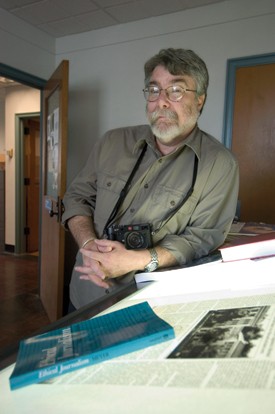
"We've lost some of the reporting on serious issues. News values simply have changed." --Jon Hughes, journalism professor
UC alum Hamner readily agrees that television programming seems to slide further and further away from those touching "Goodnight, John-Boy" moments. "There is a lot of vulgarity on TV," he says. "We tolerate grossness -- shows like 'Fear Factor.' And we certainly don't need reality programs that bear no resemblance to the reality most of us know.
"I suppose it's human nature to be interested in the bizarre and the outlandish. Going back to the Roman Circus, we watched the Christians being consumed by the lions.
"Maybe it's nothing new," he continued, "but it's tiresome. I don't want to be reminded daily that people are capable of perpetrating such heinous things."
An abundance of news broadcasts on monstrous crimes further contributes to people's perception of a moral decline, philosopher Julian Wuerth suspects. "The moral shortcomings of people are much more visible to us today. Every little shortcoming makes its way into mainstream news and the Internet.
"Local news is devoted to the most sensational events because the market is responsive to that. In the past, TV stations weren't willing to offer that level of programming. Now TV producers are willing to show it because the viewers are willing to watch it," says the father of three whose family owns no television.
"People will tell you there's a lot more sin around today than there was 50 years ago," Hamner continues. "But I always remember something my grandmother Giannini said when I asked her in the early '50s about the difference between her generation and mine. 'The only difference,' she answered, 'is that people today do on the front porch what we used to do out back.'"
Decades ago, media executives began realizing that people were willing to buy a ticket to be voyeurs at the porch railing. "We have to remember that first and foremost, media is a business," says Jon Hughes, director of UC's new journalism program and director of the A&S writing programs.
"We have more and more media forms, which leaves fewer and fewer readers and viewers concentrated in one place," he explains. "So the competition for those readers and viewers has multiplied many times over in the past few years.
"In order to attract readers and viewers, the content of material has changed, and we've lost some of the reporting on serious issues. News values simply have changed."
Philosopher Chris Cuomo finds that sad. "When mass media assumes the consumer to be dumb, then they create stupidity. It's self-propagating. That's just how it works."
In the political arena
Following last fall's presidential election, the media appeared to be on the side of serious news when it reported how exit polls showed the issue of "moral values" had won the election. But political science professor George Bishop doesn't buy it. "The phrase 'moral values' is an illusion," he says.
"I see the phrase being used as an umbrella term for the traditional Bible-believing Christian view of the world, which may include prayer in school and stands against teaching evolution, doctor-assisted suicide, gay marriage, abortion and pornography. But moral values can mean lots of different things to lots of people. It's all so relative.
"When the political left considers moral values, they think other issues come into play -- taking lives in war, continuing to let people live in poverty, letting people die of AIDS in Africa and difficulties in getting drugs and health insurance in our country.
The sad truth is that most evil is done by people who never make up their minds to be good or evil.
-- Hannah Arendt, political theorist, 1906-75
"Years ago, religion and politics tended to be separate in our society," says the professor who teaches Religion and Politics. "When John Kennedy was elected president, he went out of his way to say the church would have nothing to do with how he would run the country."
But that separation, he says, began to change shortly after Kennedy. Bishop identifies the Republicans' religious alignment as a slow-developing reaction to the counterculture movement of the '60s, a reaction that gained significant momentum rallying around the Roe v. Wade decision in 1973.
"Lots of people found experimentation with sex, drugs, different lifestyles, the liberation of women, all that stuff threatening," Bishop says. "Any movement generates a reaction, and reactions take awhile to develop. You just don't organize resistance overnight."
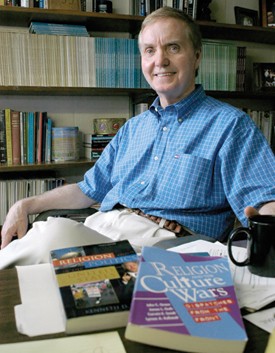
"The phrase 'moral values' is an illusion." -- George Bishop, political science professor
The serious harm to society, as UC political science professor George Bishop sees it, comes not from a decline in values, but from animosity between political parties. “We're witnessing the symptoms of religious and political polarization,” he says. “There's much more antipathy, intense partisanship, lack of tolerance of other people's views.
“It cuts both ways. We aren't talking to each other. We aren't listening to each other. We aren't even watching each other. Something serious has been lost.”
What makes this polarization different from previous signs of partisanship? He offers a vivid example: When those on the political left see George W's face on the TV screen, they literally turn the channel, but that is not how they reacted to his father, he says. The mentality has changed.
Likewise, their counterparts bristle at the mention of Hillary, Bishop claims. “She's a lightning rod. It happens on both sides.”
Of course, the average person is not really paying a lot of attention to politics, he adds. The “attentive political core” experiencing this polarization is maybe 25 to 40 percent, he guesses. “But we're the ones at each other's throats, defining each other as good or bad. Moral values have become part of the polarization.”
Polarization's threat to American society gains intensity from the fact that it opposes tolerance of cultural diversity, says Cuomo. “The American tradition acknowledges that we can flourish in a society with people who don't share our values, but this idea that there ought to be just one set of values is a real rejection of the whole idea of ethics.
“You wouldn't need democracy if everybody agreed on values. You wouldn't need to say everyone's opinion counts if everyone's opinion was the same."
“Values shape our ethics, but ethics is the place where we deal with people fairly even if they don't share our values. I am committed to the idea that all of us are morally valuable because we are all special.”
Larry Jost agrees, “The founders of our country realized that deep differences existed, and they wanted to err on the side of tolerance. They had vast experience with religious intolerance.”
Foundations of democracy
Whether moral differences among people have intensified over the years or people have merely become less willing to discuss them, the result is the same. Genuine dialogue has died.
“This is very damaging to a democratic society to have talks about ethical engagement stop at the level of values,” continues Cuomo, who teaches a class in Philosophy and Religion. “Ethics is where we ask, 'Given that we have diverse values, how are we going to get along fairly?'
“When we stop at the level of values, we don't go to the higher moral ground where we ask what it means to respect people's rights in a society with different values and religious views. This is the foundation of democracy.
“It's not that virtues give you a simple picture of right and wrong; virtues give you wisdom to help you negotiate a very complex and confusing world. Virtues don't make things seem simple.”
When you deal with human rights you are not dealing with something clearly defined in the Constitution. They are rights that are clearly defined by the mandates of a humanitarian concern.
-- Martin Luther King Jr., 1929-68
But people long for the world of their childhood where the good guys wore white and the bad guys wore black. “They think a clear picture of good and evil will reduce anxiety,” Cuomo says, “but all that anxiety gets pushed onto others. Anxiety has to go somewhere.
“The sad thing about this moment is that instead of thinking how can we make the most of the prosperity and ingenuity, we're at war on every front. Society can only grow and turn conflicts around if there's room for the voice of the 'other.' We need a social milieu that says you have to respect people who are different from you.”
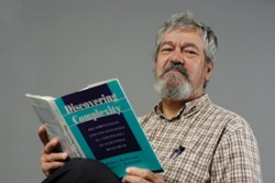
"Principles of ethics appeal to anyone of good will and intelligence." -- Larry Jost, philosophy professor
Of course, humans are good at justifying our actions -- to others and to ourselves. But the reality is: Picking on others, while distasteful, is part of our human nature, explains University of Cincinnati psychologist Hal Fishbein, who wrote an award-winning book on the topic (“Peer prejudice and discrimination: The origins of prejudice”).
“We acquired the predisposition to prejudice and discrimination because we lived as tribal species, as hunters and gatherers for 99 percent of our existence. The most dangerous folks were those who were the neighboring tribe next door.
“So my argument is that there is a genetic/evolutionary predisposition to develop characteristics to survive in that environment. We're still wired that way. Genetically, we're still hunters and gatherers even though we don't need to be.”
UC's Chris Cuomo doesn't argue the point, but begs people to remember they have brains. “We need many more factors in our judgment besides our gut feelings,” she says. “That's why we teach critical thinking across the board at the university. Those skills are crucial.
“Our ethical life in a larger society requires taking in data, talking to each other as fully valuable and respected moral beings. From that conversation, we make a judgment. That's the whole idea of democratic input -- thinking about the good of the community.”
Some people view our polarization and gravitation toward black-and-white answers to be a devastating finish to the human race. The philosophy department's Larry Jost is among the more pessimistic thinkers.
“Americans,” he cautions, “are in the grip of a devastating decline in our basic commitment
to the Constitution, the Bill of Rights, equality, tolerance to differences of opinion, American
values for freedom, an interest in making things better for everyone. George Orwell was off by 20 years. '1984' is the best forecaster for what is happening.”
To educate a person in mind and not in morals is to educate a menace to society.
-- Theodore Roosevelt, 1858-1919
Cuomo offers an opposing perspective: “The positive news is that this is a growth stage of readjusting to different technological realities. During a time of adjustment, there is always going to be more chaos, which will seem like decay.
“But in that chaos, we also see some really wonderful moments. No matter what side you were on in the election, to see that outpouring of energy and people caring was a good sign. When people get involved, that's always a good sign.
“I value democracy, even though people always screw up. But that involvement is always going to lead to a good place.”
Related articles:
Alternative spring breaks build character
Links:
Earl Hamner shares Hollywood insights
Fishbein's book "Peer Prejudice and Discrimination" on Amazon
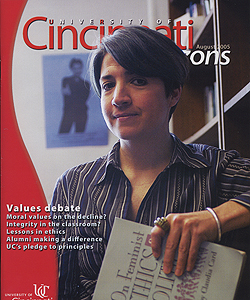
 Past Issues
Past Issues